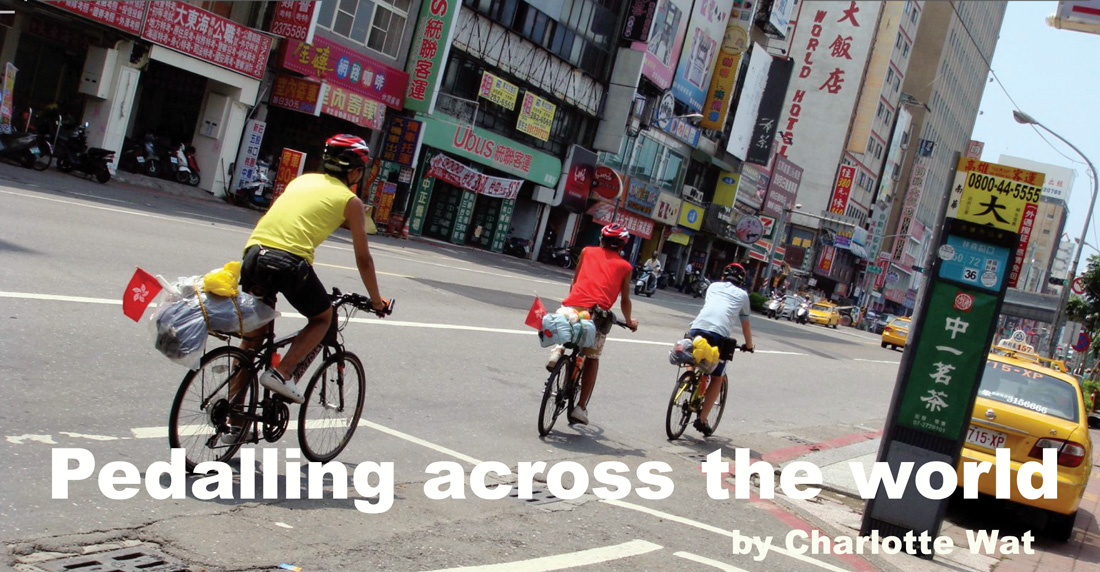While many people prefer package tours with packed itineraries filled with photo-taking sessions and shopping, more people are travelling by bike which they find more adventurous, engaging and fulfilling.
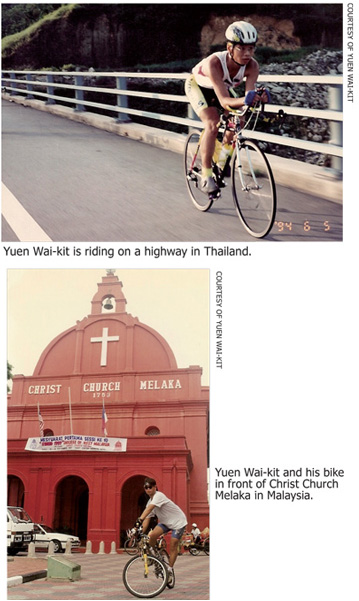 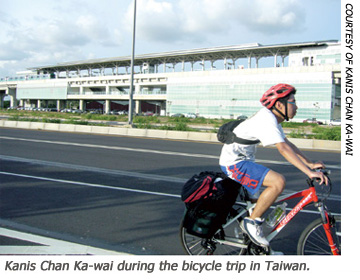 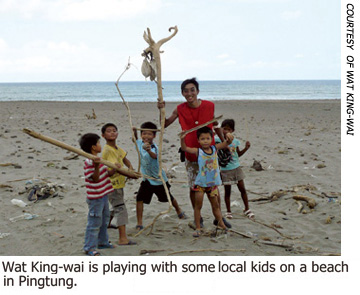 |
Yuen Wai-kit, 32, travelled to Thailand, Singapore and Malaysia on a bike. "Bicycles are my legs. If I travel by bike I don't have to think about other kinds of transportation,"he said.
Yuen started his bicycle touring at the age of 15 in 1994. He went to Malaysia with the Hong Kong Triathlon Team of which he was a member, and rode from Kuala Lumpur to Penang for two days as a part of their training.
After two bicycle tours with the Triathlon Team, Yuen decided to plan a four-day bike trip with his friend across Singapore and Malaysia in 1997. What had inspired him to travel on bike was the boring way most Hong Kong people travel.
"The schedule (of package tours) is packed with visiting as many scenic spots as possible. You've got no free time and no choice on where you will visit,"said Yuen. He also said that he could not get to know the country by joining a package tour. Travelling with a bicycle, in contrast, enabled him to plan and enjoy his journey.
Despite the flexibility of the tour, travellers have to prepare for unexpected obstacles and accidents, which might be challenging, especially on a long distance journey. But Yuen regards these challenges as part of the adventure.
"Once the wire of one of our bicycles was broken and I had to repair it on the street. Some people may consider this bad luck, but I would rather treat these all as a part of the experience,' he said.
Yuen has not travelled on his bike since 2002. His role as a father and difficulty in looking for a travel companion are the reasons for giving up bike travels. He described his travel companion as a partner. "A good partnership is hard to find. You have to find someone who has similar level of cycling skills and is willing to travel with you,"said Yuen.
Three fresh university graduates found each other good travel companions when they looped around Taiwan for 13 days in June this year, right after graduating from the Chinese University of Hong Kong.
One of the tour members Kanis Chan Ka-wai said: "It is a good to do this at our age. We may not have the chance later when we start focusing on our careers."
Chan and his two friends, Wilson Hung Chun-yu and Yu Kuk-ming are fond of cycling and often ride together. Wishing to challenge themselves, they then decided to go for a long-distance bicycle trip to Taiwan where they all had wanted to go for a long time.
The trio had an unexpected and memorable experience while in Taiwan where they met friendly local people. They recalled that one night while dining outside a convenience store in a village in Taidong, in eastern part of Taiwan, one aborigine approached them and invited them to join her 60-year-old mother's the birthday party. At the party they tried the local cuisine, sang and danced with the aboriginal people and had a fun night.
They also met fellow bike travellers there whom they shared their travel experience with. Other road users showed their support on the highway by honking their car horns and cheering when they went by.
Three other young men also travelled Taiwan by bicycle with a goal more than just simply for leisure. They raised funds for their alma mater and wanted to encourage other young people to turn thought into action through their experience in organising the trip.
"At the beginning, my friends and I often talked about travelling to other countries by bicycle. But the most important thing is to say ¡¥yes' and take action,"one of the travellers, Wat King-wai recalled the analogy he told his friends to realise their dreams, "the train is leaving on time anyway. You have to make a decision on whether to get on or not."
Wat's friends, Gary Lai Pak-lok and Sam Leung Cho-fai decided to take him up on this challenge. They took a two-week vacation from work to travel to Taiwan in this September.
Other than determination, they were also well prepared for the trip. They did a lot of research about bicycle tours and gained mechanical knowledge of bikes. They practised cycling regularly and each practice they increased the distance they rode. In the last three weeks before the trip, they practised once and sometimes twice a week. They rode an average of 100 km which is equivalent to the distance they planned to ride every day in Taiwan.
Throughout the trip, they received a warm welcome from the local people. For example, one owner of a hot pot restaurant offered them a free meal and free accommodation at his house.
"This kind of hospitality is hard to find in Hong Kong,"Wat recalled. "I would like to do the same to help other travellers, as well as the people around me."
Wat hoped that their experience in organising the trip would inspire others to do what they want to do. "People always have many thoughts in their mind, but very few act on them. That's why we have set up a blog to share our experiences after the trip,"said Wat.
"Travelling by bicycle enables us to utilise our physical strength and view things from a different perspective. We have all had an unforgettable experience,"Wat said.
They also planned to set up a scholarship with the funds they raised on the trip for the United College of the Chinese University of Hong Kong, where Wat and Leung are alumni, in order to encourage students to make a contribution to the college and society.
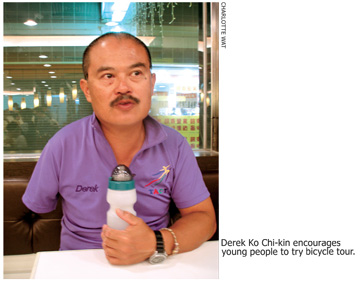 |
Some bike travellers travel for months or even a year. Derek Ko Chi-kin, a 51-year-old training director of a consulting company, travelled by bike to Europe and the United States on his own, despite the loss of his right arm in an accident at the age of 12.
In spite of his disability, Ko loves outdoor activities and has learnt many different kinds of sports. He started riding a motor bike that can be controlled with single hand 20 years ago.
Riding is more tiring for Ko than for other riders since he can only use his left hand to hold the bike. It is also difficult for him to use hand signals to indicate that he is going to change direction. "I have to think of more ways to get people's attention, as drivers may not realise that I am disabled,"said Ko.
In 1990, he travelled to 12 European countries in 80 days, including West Germany, Holland, Switzerland, Italy, France and England. One year later, he pedalled his way from one side of the US to the other for three months. He traversed deserts, the Grand Canyon and the Rocky Mountains.
During his US trip, Ko faced a lot of adversities. He chose a tougher route that few travelers choose; he had nine flat tyres and experienced 47-degree Celsius heat during the day and freezing cold at night.
But Ko never thought of giving up. "If this is what an adventurer has to encounter. I accept it with pleasure,"Ko said. "I have learnt how to tackle adverse circumstances, and figure out a solution."He found out more about himself as he discovered his own potential through solving problems.
The cyclist encouraged youngsters to try this healthy sport. "Bicycle travelling is good for young people,"said Ko. "You get a sense of achievement and valuable experiences from the trips.' He also advised bikers to travel as a team, so that members can support each other, overcome all the barriers, and grow together on the journey. 
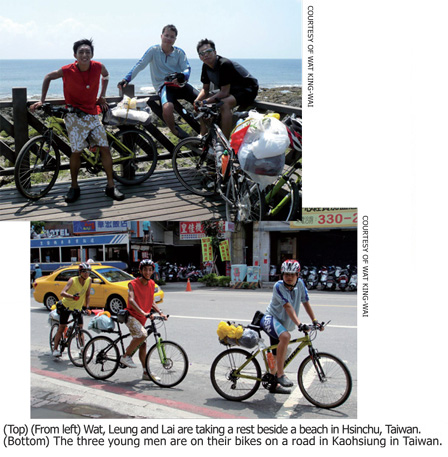 |
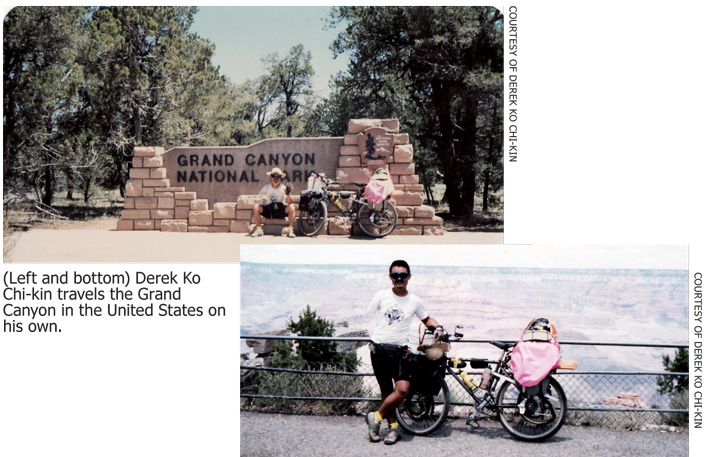 |
Start your own journey! Here are some tips provided by our interviewees from their previous bike trips. Preparation: 1. Research the destination: You should know about the recent situation of the country ¡V whether there is any social disorder or instability. 2. Plan the trip: Keep in mind that the route for backpackers may not be suitable for bicycle travellers, since many scenic spots are not accessible by bicycle and would cause inconvenience. 3. Physical fitness: You should keep your weight low to facilitate cycling. You should also practise cycling regularly and gradually increase the training distance leading to the actual distance you plan to ride daily on the trip. 4. Accommodations: Plan for at least three options each night in case of any unexpected changes in the journey. Precautions:
|
Checklist Basic Gears:
Others: Raincoat
|
